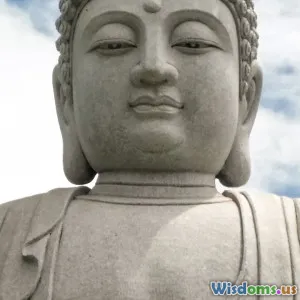
Awakening the Spirit through Philosophy
8 min read Explore how philosophy unlocks spiritual awakening by fostering deep self-awareness and meaningful existence. (0 Reviews)
Awakening the Spirit through Philosophy
The quest for spiritual awakening has fascinated humanity for millennia. Yet amidst ritual and religion, silent meditation, and mystical experiences, philosophy offers a unique and often underappreciated roadmap for awakening the spirit. Rather than relying solely on transcendental claims or dogmatic frameworks, philosophical inquiry invites us to cultivate self-awareness, confront life’s paradoxes, and seek authentic meaning. This deep intellectual engagement can spark profound transformations that ripple far beyond the mind, rejuvenating the spirit.
The Intersection of Spirituality and Philosophy
Often, spirituality evokes images of ethereal mystery and emotional transcendence, while philosophy conjures rigorous logical analysis and abstract reasoning. However, these disciplines overlap richly: both ask essential questions about existence, ethics, consciousness, and the nature of reality.
Philosophy develops tools to explore these questions with clarity and precision — helping to peel back layers of assumptions and illusions that obscure spiritual insights. For example, Socrates’ call to "know thyself" is as much a spiritual injunction as a philosophical assertion.
Renowned existentialists like Søren Kierkegaard and Jean-Paul Sartre further bridged the gap by investigating how personal authenticity and confronting despair can lead to spiritual awakening. Their work underscores that awakening involves both embracing the depths of human angst and discovering freedom within it.
Philosophy as a Catalyst for Self-Awareness
At its heart, awakening the spirit begins with self-awareness. Philosophy provides structured methods for reflection, encouraging critical questioning about our beliefs, values, and identity. This sharp scrutiny can dispel mental conditioning and open space for genuine self-discovery.
For instance, Descartes’ methodic doubt — systematically questioning even the most fundamental beliefs — forces us to confront what can be known with certainty. This radical skepticism, paradoxically, leads to discovering the self as an undeniable reality: "Cogito, ergo sum" (I think, therefore I am).
Similarly, Eastern philosophical traditions, like Advaita Vedanta, employ dialectical questioning (neti-neti — not this, not that) to dissolve identification with transient phenomena and reveal the unchanging underlying self. This contemplative reduction is both analytical and deeply experiential.
Such philosophical exercises awaken the spirit by encouraging us to stand apart from habitual mental chatter and see the deeper dimensions of being.
Overcoming Existential Dilemmas through Philosophy
Many spiritual seekers face existential crises, grappling with questions about suffering, meaninglessness, mortality, and authenticity. Philosophy not only acknowledges these dilemmas but grounds them in systematic frameworks.
Existentialism articulates the human condition as essential freedom accompanied by responsibility and anxiety. Camus’s notion of the absurd posits that while life inherently lacks meaning, we have the power to create our own through conscious rebellion and engagement.
This perspective empowers an awakening spirit by accepting life’s uncertainties rather than retreating into nihilism or escapism. It invites active participation in choosing values and living authentically despite impermanence.
The Stoics, too, offer practical wisdom for awakening — promoting resilience through understanding what lies within our control and cultivating inner tranquility regardless of external circumstances. Marcus Aurelius’s Meditations continue to inspire spiritual fortitude.
Philosophy Inspiring Compassion and Connectedness
Spiritual awakening often involves a shift from ego-centered consciousness toward interconnectedness and compassion. Philosophy nurtures this by exploring ethics and the nature of the self in relation to others.
Buddhist philosophy, though spiritual in essence, is deeply philosophical regarding suffering (dukkha), impermanence (anicca), and no-self (anatman). It encourages compassion as a natural outcome of realizing the interdependent nature of existence — a transformative insight awakening the spirit to universal kinship.
Western philosophical humanism similarly emphasizes empathy and the intrinsic worth of every person, fostering a spirituality that values ethical living and social responsibility.
Moreover, recent phenomenological philosophers like Emmanuel Levinas emphasize ethical responsibility to the Other as foundational to selfhood itself — an idea that enriches spiritual practices of love and service.
Realizing Philosophy’s Transformative Impact
Understanding philosophy merely as abstract debate misses its profound potential: nurturing a dynamic inner revolution that awakens the spirit. Today's evidence resides in interdisciplinary studies linking contemplative philosophy and mental health.
Psychologist Jonathan Haidt highlights how reflective thought improves emotional resilience and well-being, echoing ancient philosophical insights applied in cognitive therapy.
Meditative traditions combined with philosophical analysis, as seen in the modern mindfulness movement or secular ethics programs, show measurable improvements in stress reduction, moral reasoning, and life satisfaction.
Leading thinkers like Martha Nussbaum champion philosophy’s role in cultivating cultivation of emotional intelligence, compassion, and practical wisdom — all essential to spiritual thriving.
Conclusion: Philosophy as a Path to Spiritual Awakening
Awakening the spirit through philosophy transcends intellectual achievement; it is a holistic transformation. By fostering radical self-awareness, confronting existential realities head-on, and cultivating compassion and connectivity, philosophy revitalizes the ancient journey toward meaning and transcendence.
In a world inundated with noise and distraction, engaging deeply with philosophy offers a clear-eyed way to awaken from unconsciousness. It invites us to become architects of our inner lives — crafting authentic wisdom that ignites the spirit’s flame.
Ultimately, when approached with openness and courage, philosophy not only informs the mind but serves as a lifelong companion on the path to awakened being.
References:
- Kierkegaard, Søren. The Sickness Unto Death.
- Camus, Albert. The Myth of Sisyphus.
- Marcus Aurelius. Meditations.
- Descartes, René. Meditations on First Philosophy.
- Nussbaum, Martha. Upheavals of Thought: The Intelligence of Emotions.
- Haidt, Jonathan. The Happiness Hypothesis.
Rate the Post
User Reviews
Popular Posts

















